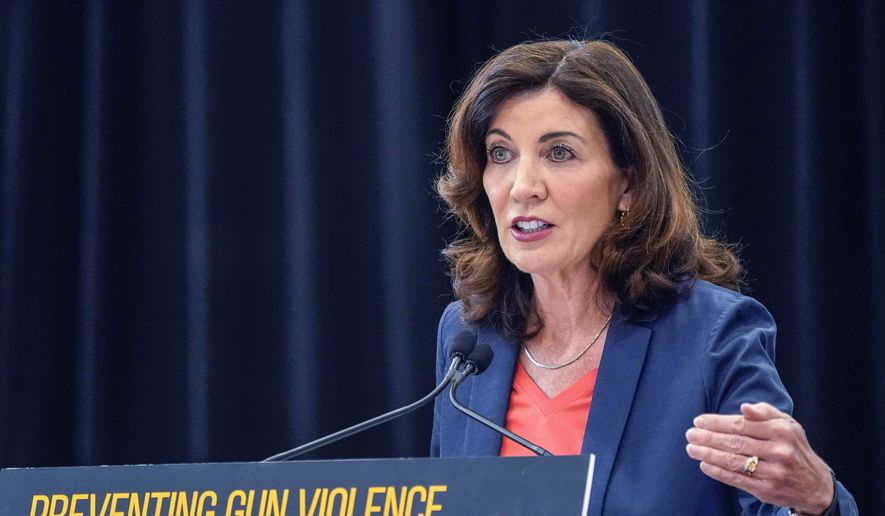Five of the six states directly affected by the Supreme Court’s ruling striking down subjective standards for concealed-carry permits have curtailed their laws, but New York has doubled down.
Lawmakers in New York have made it nearly impossible to carry a firearm into any building — public or private — within the state.
The law, which takes effect in September, eliminates a requirement to demonstrate a special need to obtain a license to carry. In its place, the state has issued a lengthy list of locations where guns are banned.
The move makes it nearly impossible to legally carry a firearm anywhere in the state, and it already is facing legal challenges.
“If you define sensitive places so broadly that you can’t carry anywhere, that’s probably overdoing it,” said Dave Kopel, a lawyer and gun rights advocate.
The legislation was introduced and passed within 24 hours of the high court’s ruling that the state’s requirements for obtaining a license to carry ran afoul of the Second Amendment.
Justice Clarence Thomas, who authored the court’s 6-3 majority opinion last month in the landmark case, said the right to bear arms for personal protection cannot be left to the vagaries of state legislatures’ decision-making and that the Second Amendment enshrining that right deserves “unqualified deference” from judges.
That doesn’t mean no restrictions are allowed, he said, but any that would have seemed bizarre to the generation that ratified the Bill of Rights cannot be made constitutional by the passage of time or changing beliefs about firearm ownership.
“Rather, the government must demonstrate that the regulation is consistent with this nation’s historical tradition of firearm regulation,” he wrote. “Only if a firearm regulation is consistent with this nation’s historical tradition may a court conclude that the individual’s conduct falls outside the Second Amendment’s ‘unqualified command.’”
It’s unclear whether New York’s new law would hold up to Justice Thomas’ directive.
The legislation bans lawful gun owners from taking their firearms nearly anywhere in the state. It identifies “sensitive locations” as any local, state or federal government building, any health care facility, any place of worship, libraries, public parks, zoos or playgrounds, child care facilities and camps, homeless and family shelters, schools, public transportation, entertainment venues, museums, sports stadiums, concerts, polling places, protests and rallies.
It requires any private building to disclose whether an individual may carry a gun inside. Without permission from an owner, a gun holder could risk criminal prosecution for carrying a firearm inside a private establishment.
“None of these novel burdens on Americans’ Second Amendment rights are grounded in history, which means they are all ripe for legal challenges and are likely unconstitutional,” said Mark Smith, a Second Amendment expert and scholar at Ave Maria School of Law.
Carl Paladino, a Republican candidate for Congress, has sued to block the legislation.
Jim Urso, deputy director of communications for New York Gov. Kathy Hochul, a Democrat, said the law complies with the Supreme Court’s decision.
“Gov. Hochul signed landmark legislation developed to comply with the Supreme Court’s recent decision in NYSRPA v. Bruen and drafted in close collaboration with the Legislature. We have no further comment given pending litigation,” he said.
The ruling in New York State Rifle & Pistol Association v. Bruen invalidated New York’s law governing concealed-carry permits, which required applicants to show they had a particular fear that justified the need to carry a weapon.
Living in a high-crime neighborhood wasn’t necessarily a good enough reason.
Five other states covering about a quarter of the country’s population — California, Hawaii, Maryland, Massachusetts and New Jersey — had similar “may issue” laws on the books, and so does the District of Columbia, though its statute has been on hold under a 2017 court ruling.
Maryland, Massachusetts and Hawaii have dropped the requirement to show a special need for a concealed-carry permit.
New Jersey has enacted laws requiring guns bought out of state to be registered and concealed-carry applicants to have firearms training. That training requirement is also required under the New York legislation.
New Jersey, though, stopped short of detailing a laundry list of “special locations” banning guns as New York lawmakers did.
California dropped the requirement to show special cause for obtaining a license but has passed other gun control measures. Democrats have vowed more will come.
California Gov. Gavin Newsom, a Democrat, signed legislation last week allowing victims of gun violence and state and local government agencies to bring civil liability lawsuits against firearms manufacturers.
Gun rights advocates say these measures will likely face legal battles and could very well fall short because of the standard set out in the Bruen ruling, which requires the government to show its restrictions are deeply rooted in American history.
“Every state is sort of puzzling what to do,” said Michael Meyerson, a law professor at the University of Baltimore. “At this point, every gun law is open to challenge.”
States could have mirrored Connecticut’s law, said Michael Lawlor, a professor at the University of New Haven and a former Connecticut state lawmaker.
The high court highlighted Connecticut’s legislation in a footnote in Justice Thomas’ opinion pointing out that it allows government officials to reject a concealed-carry permit if the applicant is not a “suitable person.” It means officials can deny a license to anyone who has shown conduct not suitable for handling a firearm.
“One of the problems we are dealing with in the country is there are just way more guns in circulation than there are responsible gun holders,” Mr. Lawlor said.
• Alex Swoyer can be reached at aswoyer@washingtontimes.com.




Please read our comment policy before commenting.